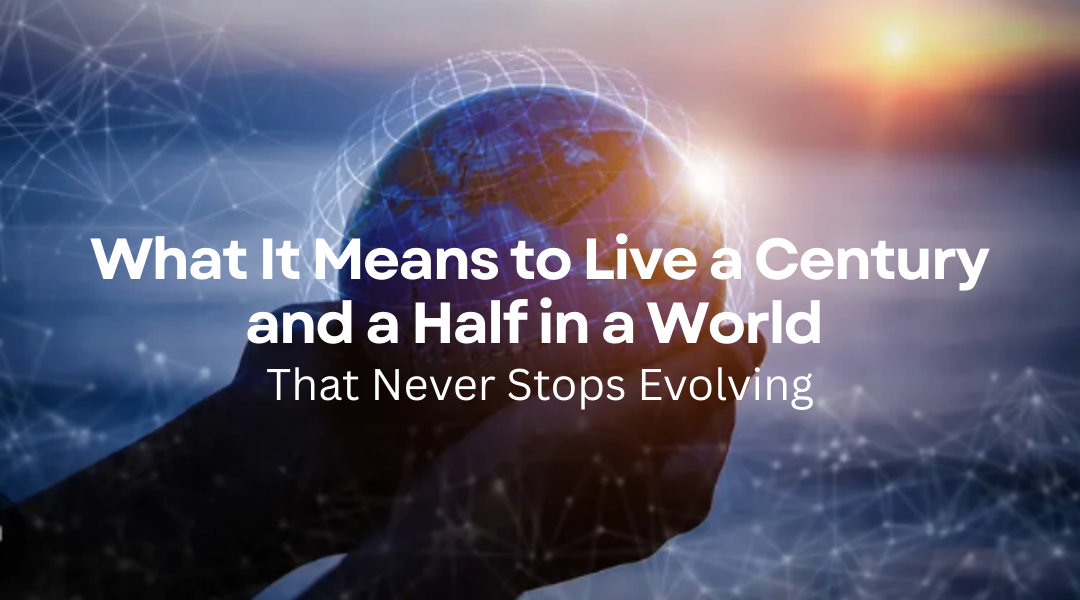Prologue: A Life Unfolding
The year is 2150. The world hums differently now—less like a machine and more like a living thing. Cities pulse with organic light, buildings breathe, and the sky is dotted with silent transports weaving between urban forests. Death isn’t the looming specter it once was. For people like Amina Patel, who’s lived 150 years, life isn’t about surviving—it’s about reinventing.
Morning in a Living City
Amina wakes to the soft glow of her bedroom adjusting around her. The walls, embedded with responsive biotech, filter the air to match her lungs’ needs. Sunlight spills in, not through glass, but through photosynthetic membranes that clean the atmosphere as they illuminate.
Eli, her companion system (she refuses to call it an “AI”—it feels too much like talking to an appliance), flickers into view. Not as a cold hologram, but as a presence, like an old friend leaning against the windowsill.
“Your brain’s been busy overnight,” Eli notes. “Dream patterns suggest you’re working through that new mural idea. Should I clear your schedule?”
This isn’t science fiction. It’s just Tuesday.
A Life Stitched Across Centuries
Born in 2000, Amina remembers the awkward adolescence of technology—dial-up screeches, the first clunky smartphones, the way social media went from a novelty to a lifeline to a burden. She remembers when “health tech” meant counting steps on a wristband and hoping for the best.
Then, at 50, a diagnosis that would have been a death sentence in another era: early neurodegeneration. But this wasn’t the past. Medicine had learned to negotiate with time.
The Turnaround
She enrolled in a trial that didn’t just treat disease—it rewired her biology. Stem cells, guided by molecular architects, repaired her fading synapses. Telomeres, those tiny timekeepers at the ends of her DNA, were coaxed into resetting. By 70, she was hiking the Himalayas. By 90, she was advising the next generation of bioengineers.
Amina didn’t just recover. She outran the clock.
Multiple Lives, One Timeline
With extra decades came the freedom to pivot—again and again.
- As a Professor: She taught neurophilosophy, wrestling with questions like, If a machine learns to dream, does it deserve rights?
- As an Artist: Her augmented-reality murals now sprawl across cities, shifting with the moods of passersby.
- As a Mentor: She’s guided everyone from climate architects to poets, because in a long life, expertise isn’t linear—it’s cumulative.
How 150 Feels at 50
Amina’s body defies old expectations. Nanosurgeons in her bloodstream mend wear and tear before she feels it. Predictive systems, trained on a century of her data, nudge her toward the right foods, the right conversations, even the right memories to revisit. Every decade or so, she undergoes a gentle cellular refresh—not to chase youth, but to maintain the vitality she’s earned.
Strangers guess she’s in her 50s. She laughs. Age is just a number now, and she’s stopped counting.
A Society That Grew Up With Her
Humanity adapted to longevity in messy, beautiful ways:
- Work: Careers stretch like accordions—people master multiple fields, take sabbaticals to learn new skills, or pivot entirely at 120.
- Family: Great-great-grandchildren video-call from Mars colonies. Marriage contracts renew like library books—some lapse, some get extended.
- Culture: Traditions evolved. Retirement? Obsolete. Elders aren’t sidelined; they’re the ones steering the ship.
The Weight and Gift of Time
At 150, Amina’s days are fuller than ever. She hosts salons on ethical AI, funds open-source longevity clinics in regions that once had no healthcare, and still finds time to paint.
But the real legacy? Perspective. She remembers when the planet buckled under climate collapse—and when humanity finally course-corrected. She’s seen colonies rise on the moon not as escapist fantasies, but as extensions of Earth’s ecosystem.
Epilogue: The Quiet Triumph
On a balcony overlooking New Mumbai, Amina watches hybrid birds—part organic, part synthetic—dip through the sky. Their wings leave faint trails of light, like brushstrokes fading into the air.
“It was never about living forever,” she tells Eli. “It was about living well enough to want to stay.”
Her story isn’t unique in this era. But it’s proof: when time stretches, what matters isn’t how much you have—it’s what you do with it.
Final Thought: The Real Miracle
Amina’s world isn’t about cheating death. It’s about earning the years. Longevity didn’t just give her more life—it gave life more meaning. And that’s the true breakthrough.
